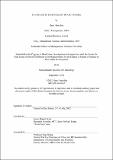The Holistic Technology Impact Model
Author(s)
Hanschke, Hans
DownloadThesis PDF (6.385Mb)
Advisor
Scott, James Robert
Terms of use
Metadata
Show full item recordAbstract
This research outlines the path towards creating a tool which enables profit driven real estate developers to analyse at an early stage which sustainable innovations can provide the greatest value for their project.
Elaborating on the urgency for change towards sustainable development approaches within the real estate industry, existing barriers were found between the approaches proposed by the academic scientist and the industry practitioners. In order to remove these barriers, it is proposed to build a Holistic Technology Impact Model based on findings from academic and industry sources which utilizes Monte Carlo Simulation techniques to provide the user with a customized sustainable development strategy.
After the user provides early-stage information about the targeted project, such as location or a raw timeline, the model calculates a business case for a project without any green features and compares it to business cases of implementing one of the ten sustainable technologies included in the sample. Using Monte Carlo Simulation, the model can effectively account for future developments of variables such as energy prices, emissions penalties, economies of scale or a tenant’s willingness to pay.
The outcome of the model not only provides customized implementation suggestions for the real estate developer but also enables researchers to analyse risk and return patterns as well as emissions performance of the distinct technologies across varying project characteristics, which is illustrated via three sample projects in this thesis. Thereby, it does not only provide strategic insights for the real estate developer, but also for the public sector, as well as the technology suppliers. In sum, the model combines practical and academic approaches to foster the transformation towards a green real estate industry.
Date issued
2022-09Department
Massachusetts Institute of Technology. Center for Real Estate. Program in Real Estate Development.Publisher
Massachusetts Institute of Technology